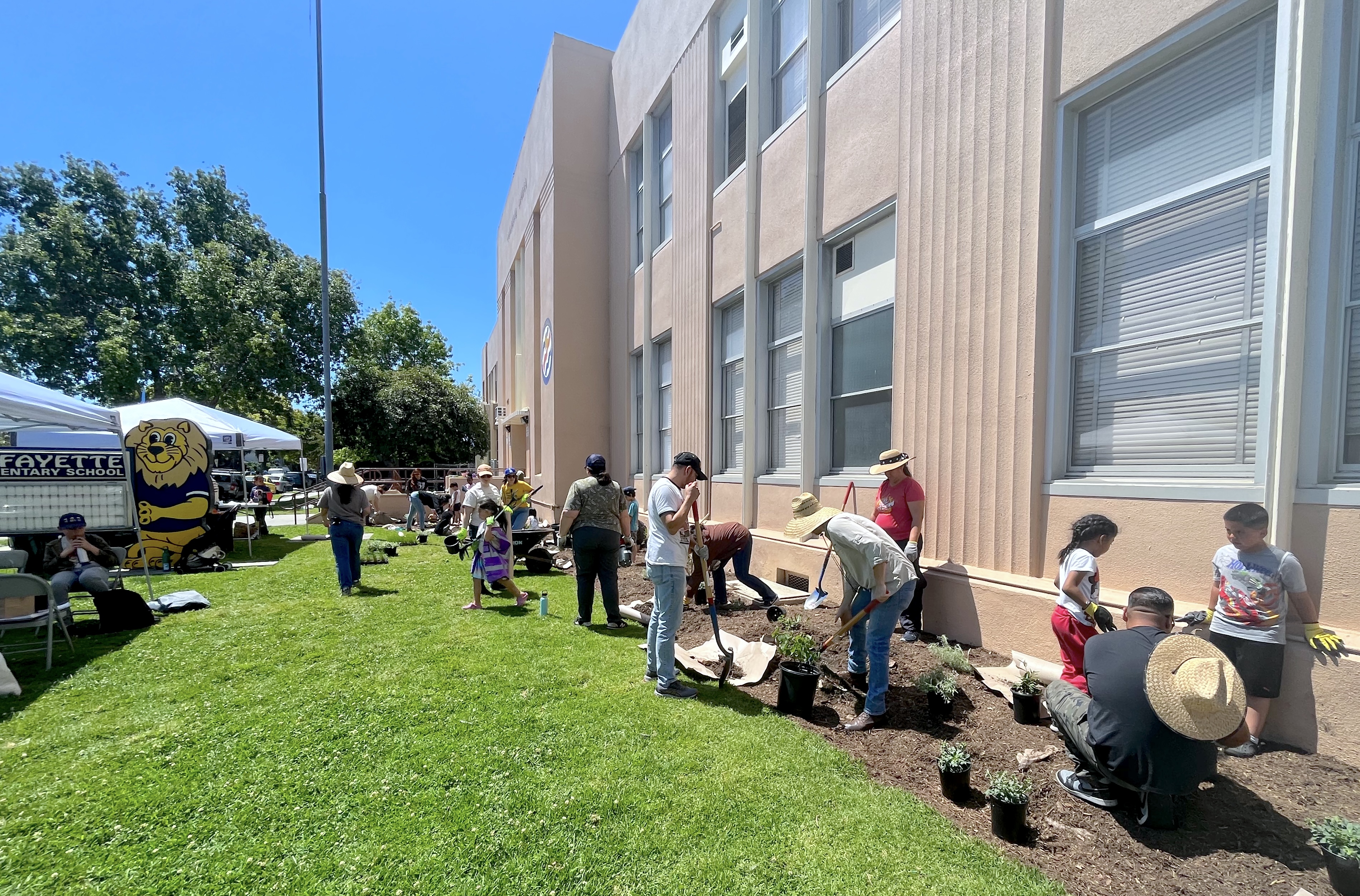
Ocean Friendly Gardens in schools bring accessible examples of healthy watersheds to kids where they learn and play. The students and their families are creating the climate-resilient, biodiverse future they want to see in their community and inspiring environmental stewardship in the next generation!
Lafayette Elementary School & the Nature Club's vision
Lafayette Elementary School, like many other school buildings, is surrounded by flat grass lawns and a few dark green, box-shaped rows of hedges against the walls. The greenery is low diversity, uses lots of water, and is more decorative than functional.

Lafayette is a Title 1 school, which means it has been designated as a school that serves a high proportion of low-income families. Like many other Title 1 schools, raising funds for projects and extracurricular activities can be challenging compared to schools in wealthier areas supported by PTA funds and parents who can volunteer their time.
Sandra Acosta, a parent volunteer who leads the Lafayette Nature Club at the school, had a vision for native plant habitat by the front entrance that students could steward and enjoy. The club started replacing the hedges with native plants in 2020, and they were ready to continue expanding the habitat across the front of the school. With support from Accelerate Resilience L.A., a sponsored project of Rockefeller Philanthropy Advisors, & the Maxwell/Hanrahan Foundation, the Long Beach Chapter was able to help make the Nature Club's vision come to life!
Preparing the site for success
The Long Beach OFG team helped design rainwater retention features like bioswales and berms to capture rainwater that falls on the garden and prevent it from becoming polluting runoff. The new OFG will be a teaching tool to show how simple contours can slow the flow of runoff and let it sink in and hydrate the soil.
The chapter collaborated with the city's water conservation department to participate in the Lawn to Garden Rebate program, which will provide funds to support the Nature Club's stewardship of their new OFG. Thanks to the support of the water department, Lafayette is now the first school in the city to receive the Lawn to Garden rebate! Because the rebate program is designed for residential properties, the school site presented some unique challenges and obstacles. This collaborative project helped identify what resources are needed to support schools moving forward, and the garden will be an example to inspire more OFGs at schools.
Left: Long Beach Chapter's OFG Lead Kai Craig and SoCal OFG Coordinator Kathryn Dressendorfer talk to the Lafayette Nature Club about designing the new garden; Right: Volunteers Ronnie, Laura, and Isabel mix cactus soil and create the bioswale.
After the hedges and grass were removed from the project area, volunteers dug a bioswale at the front edge of the new habitat and created a berm toward the wall of the building. The contours created will help direct rainfall away from the foundation of the building and act as a buffer between the low-water OFG and overspray from the sprinklers that water the grass. Water-loving native plants in the bioswale will help absorb the water into the ground, filtering nutrients and preventing runoff.
Well-draining cactus soil was mixed into the existing soil to promote drainage and fill in the uneven spots left by the hedges. Volunteers then covered the area with recycled brown paper and a thick layer of mulch. This combination of paper and mulch is called "sheet mulching" and helps prevent grass and weeds from growing back until the plants get established. It is an ocean-friendly alternative to using plastic weed cloth that degrades into plastic pollution as it ages and breaks down.
Planting day fun with Surfrider Long Beach
After lots of planning and prep, planting day finally arrived! The workday began with a ceremony conducted by Acjachemen tribal representatives honoring the four directions and "welcoming the plants home". After a demonstration about how to plant around the sheet mulch, all of the students and their families grabbed shovels and began planting.
Left: Acjachemen tribal representatives hold a ceremony and procession honoring the four directons; Right: Volunteers help the students plant
The kids joyfully dug holes, discussed which plants were their favorites, and worked together to tackle this exciting new activity. Surfrider volunteers guided students throughout the planting process, and together the volunteers planted 127 native plants, including 3 trees. The diverse array of native plants and trees will provide a colorful, vibrant habitat for pollinators and refuge for local wildlife like birds and lizards.

Above: Students get hands-on experience planting the new OFG
The deep root systems of the native plants will help the soil absorb and filter runoff in the rainy season and provide resilience to drought and heat in the summer. The extensive root systems will also store carbon long-term and support healthy, spongey soil.
The expanded habitat will function as a hands-on outdoor classroom that can be utilized for monthly Nature Club meetings and by teachers for on-campus mini field trips. The OFG offers opportunities for students to learn about interconnected ecosystems, the indigenous peoples of the area, and how landscapes can support healthy watersheds.
Left: A family helps plant a California lilac (Ceanothus); Right: Surfrider LB volunteer Amy Foell helps guide students during planting
The Chapter and the Lafayette Nature Club are excited to watch this Ocean Friendly Garden grow!
Learn more about Surfrider’s Ocean Friendly Gardens program and how your own yard can support clean water and resilient communities. Like what we're doing? Come garden with us or support our chapter by becoming a member!








